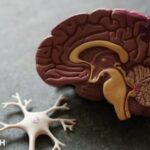Table of Contents
Introduction
Gamma-aminobutyric acid, commonly known as GABA, is a neurotransmitter that plays a crucial role in the central nervous system (CNS). It acts as an inhibitor, reducing the activity of neurons in the brain, which helps to balance out the excitatory signals sent by other neurotransmitters. In this article, we will dive deep into the functions of GABA in our brain and its potential benefits and side effects.
What is GABA and How Does it Work in Our Brain?
GABA, a naturally occurring amino acid, acts as a neurotransmitter within the brain. Synthesized from glutamate, an excitatory neurotransmitter in the CNS, GABA is stored in vesicles and subsequently discharged into the synaptic cleft. Upon release, GABA interacts with GABA receptors on the postsynaptic neuron.
GABA reduces the activity of neurons in the brain by opening chloride ion channels in the postsynaptic neuron. This causes a surge of negatively charged chloride ions, thereby hyperpolarizing the neuron. As a result, it becomes less prone to fire an action potential in response to excitatory signals generated by other neurotransmitters like glutamate.
What are the Functions of GABA in the Brain?
GABA plays several important functions in the brain, including:
Regulating Anxiety and Stress: GABA is well known for its anxiolytic (anti-anxiety) and calming effects. It helps to reduce the activity of neurons in the amygdala, a brain region that is responsible for processing fear and anxiety.
Promoting Sleep: GABA is involved in the regulation of sleep. It helps to increase the production of melatonin, a hormone that plays a key role in the sleep-wake cycle.
Controlling Muscle Tone: GABA also plays a crucial role in controlling muscle tone. It acts as an inhibitor, reducing the activity of motor neurons in the spinal cord that control muscle contraction.
Regulating Seizures: GABA is an important factor in preventing seizures. It helps to reduce the excitability of neurons in the brain, which can help to prevent abnormal electrical activity that can lead to seizures.
What are the Potential Benefits of GABA?
Due to its significant functions in the brain, GABA has been extensively researched for its potential health advantages. Below are some potential health benefits of GABA:
Anxiety and Stress Reduction: GABA supplements have been shown to help reduce anxiety and stress levels. Several studies have shown that GABA supplements can increase alpha waves in the brain, which are linked to relaxation and calmness.
Improved Sleep Quality: GABA supplements can also improve sleep quality. Studies have demonstrated that GABA supplements can increase the duration of sleep and decrease the time it takes to fall asleep.
Muscle Recovery Enhancement: GABA supplements may also help improve muscle recovery. Research has demonstrated that GABA supplements can increase growth hormone levels, which play a significant role in muscle growth and recovery.
What are the Potential Side Effects of GABA?
While GABA is generally considered safe, it may cause some side effects in certain individuals. Some of the potential side effects of GABA include:
Drowsiness: GABA supplements may cause drowsiness in some individuals, especially at higher doses.
Nausea: Some people may experience nausea or upset stomach when taking GABA supplements.
Headache: GABA supplements may cause headaches in some individuals, especially at higher doses.
Interference with Medications: GABA supplements may interfere with certain medications, including anti-anxiety medications and antidepressants. It is important to consult with a healthcare professional before taking GABA supplements if you are on any medications.
How Can You Increase Your GABA Levels Naturally?
While GABA supplements are available, there are also several natural ways to increase your GABA levels, including:
Exercise: Exercise has been shown to increase GABA levels in the brain. Any form of exercise, from running to yoga, can help to boost your GABA levels.
Meditation: Meditation has been shown to increase GABA levels in the brain. Regular meditation practice can help to increase feelings of relaxation and reduce anxiety.
Sleep: Getting enough sleep is crucial for GABA production. Make sure to get enough sleep each night to help promote healthy GABA levels.
Diet: Eating a balanced diet that is rich in whole foods, especially those that are high in protein, can help to boost GABA levels.
Conclusion
In summary, GABA, as a potent neurotransmitter, holds a pivotal position in the central nervous system, regulating anxiety and stress, muscle tone, promoting sleep, and controlling seizures. By taking GABA supplements, one may potentially experience several benefits such as alleviating anxiety and stress, enhancing sleep quality, and augmenting muscle recovery. Nevertheless, it is imperative to remain cognizant of potential side effects and to seek guidance from a healthcare professional prior to consuming any supplements. Moreover, adopting natural techniques, such as exercising, meditating, sleeping well, and maintaining a balanced diet, may also boost GABA levels in the brain in a more organic way.
FAQs
Are GABA supplements safe?
While GABA supplements are generally considered safe, they may cause side effects in some individuals. It is important to consult with a healthcare professional before taking any supplements.
Can GABA supplements help with anxiety?
Yes, GABA supplements may help to reduce anxiety and promote feelings of relaxation and calmness.
How do I know if I have low GABA levels?
Low GABA levels may be associated with symptoms like anxiety, insomnia, and muscle tension. However, it is important to consult with a healthcare professional for an accurate diagnosis.
Can I get GABA from food?
While GABA is present in some foods like fermented vegetables and tea, it is unclear whether consuming these foods can significantly increase GABA levels in the brain.
Can GABA supplements help with insomnia?
Yes, GABA supplements may help to improve sleep quality and reduce the time it takes to fall asleep. However, it is important to consult with a healthcare professional before taking any supplements.








